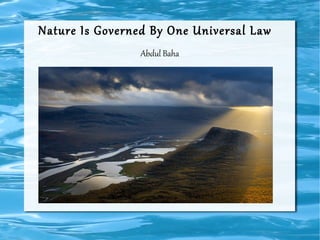The Baha’i Faith, emerging from the fertile ground of 19th-century Persia, espouses a myriad of profound principles which govern both the individual and collective human experience. Among these tenets, the notion of the “One Universal Law” threads through the fabric of its teachings, providing insights into nature’s governance and the interconnectedness of all beings. This article delves into the Baha’i view of this universal law, analyzing its implications on various aspects of existence and societal structure.
At the heart of Baha’i teachings lies the understanding that there is a singular law that governs the universe. This law transcends cultural, geographical, and temporal boundaries, positing that the underlying principles shaping humanity’s interactions and the natural world are universal. The Baha’i perspective emphasizes that recognizing this law leads to a greater sense of responsibility, unity, and harmony among individuals. Such recognition is pivotal in addressing the multifaceted challenges that beset contemporary society.
One of the prominent aspects of the Baha’i teachings regarding the One Universal Law is its intrinsic connection to the concept of unity. The Baha’i Faith advocates for the oneness of humankind, asserting that all people, irrespective of race, nationality, or creed, are interconnected. This unity extends beyond human relationships to encompass nature itself, emphasizing that the laws governing the natural realm are reflective of a higher, divine order. Thus, Baha’is assert that understanding the universal law helps individuals cultivate an appreciation for the environment and the responsibilities entailed in its stewardship.
Furthermore, the Baha’i view articulates that the One Universal Law operates both in the physical and the spiritual domains. In the material world, natural laws govern phenomena through observable principles such as gravity, evolution, and the laws of thermodynamics. Analogously, in the spiritual realm, ethical and moral guidelines emerge from adherence to the One Universal Law. Dialogue on ethics such as justice, equity, and compassion all stem from understanding this overarching framework, which ultimately encourages individuals to act in accordance with collective welfare.
Another salient feature of this law is its dynamic nature. Baha’i teachings assert that while the essence of universal law remains constant, its applications and interpretations evolve in response to the changing needs of society. Historical context plays a crucial role in shaping the understanding of these laws. For instance, Baha’is believe that religious revelations throughout history represent successive chapters in humanity’s understanding of spiritual and ethical governance. This progressive revelation unfolds intelligently, much like scientific discoveries clarify the workings of the universe over time.
In terms of guidance for personal development, the Baha’i teachings articulate that awareness of the One Universal Law can serve as a potent catalyst for individual transformation. Baha’is are encouraged to cultivate virtues such as love, integrity, and altruism, all of which align with the universal principles that govern personal comportment. As individuals embody these virtues, they inevitably contribute to the elevation of communal spirit, facilitating a collective resurgence towards a more just and harmonious world.
Moreover, the role of education in understanding the One Universal Law cannot be overstated in Baha’i discourse. Education is viewed as the primary means through which individuals grasp the complexities of their surroundings, as well as the ethical ramifications of their choices. Baha’is advocate for a comprehensive educational framework, one that melds scientific rigor with moral and spiritual understanding, thus enabling individuals to discern their responsibilities within the grand tapestry of existence.
Importantly, the Baha’i interpretation of the One Universal Law offers an aggrandized lens through which contemporary challenges can be approached. Issues such as climate change, socioeconomic disparity, and global conflict are intertwined with the fundamental principles of unity and interconnectedness espoused by Baha’is. Viewing these challenges through the prism of universal governance fosters innovative perspectives that emphasize collaboration over conflict, solution over stagnation.
In conclusion, the Baha’i worldview encapsulates an intricate relationship between the One Universal Law and humanity’s approach to governance, ethics, and social interaction. This law serves not only as a compass guiding individual conduct but also as a framework for collective societal evolution. Baha’i teachings urge humanity to awaken to its shared destiny, advocating for a unified approach to solving the pressing dilemmas of the modern world. Through the lens of the One Universal Law, both nature and humanity are seen as part of a cohesive whole, underscoring the urgent need for a paradigm shift toward understanding, respect, and reciprocity.
Ultimately, the Baha’i view of nature’s governance through the One Universal Law advocates for a harmonious existence, fostering a global community that recognizes its shared heritage and responsibility. As individuals embrace these teachings, they are called to aspire not only to their own betterment but to the collective upliftment of humanity, manifesting a brighter, more unified world for generations to come.
